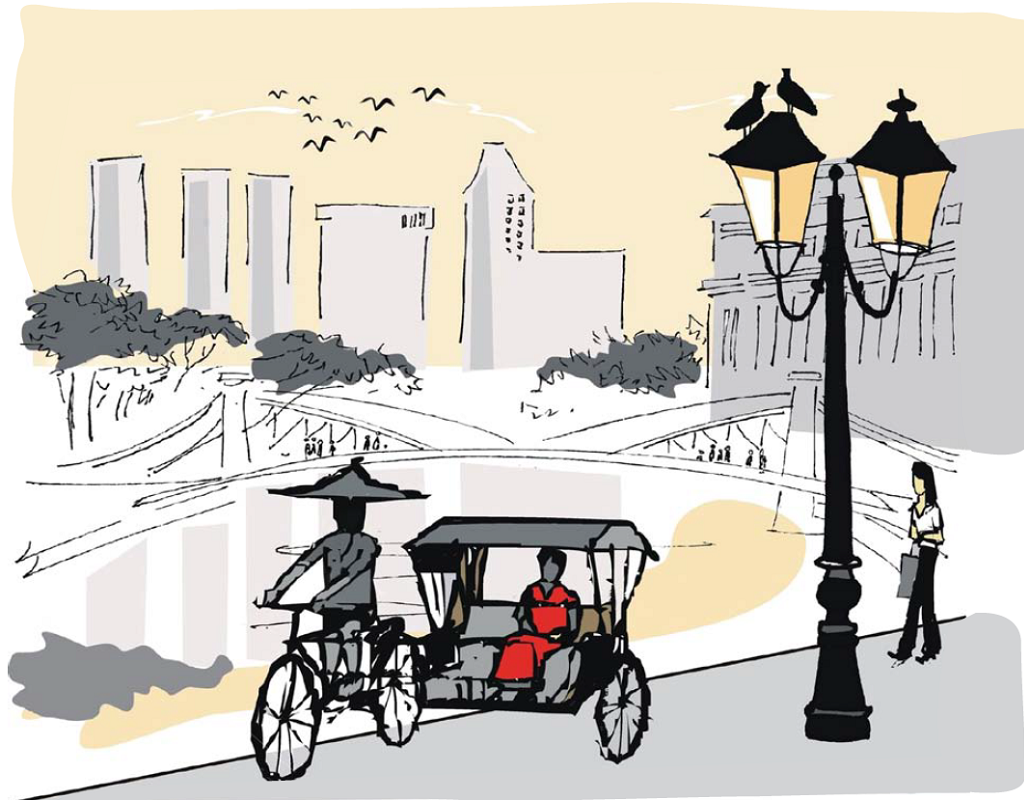1965 witnessed Singapore emerging from the political turmoil of the merger with Malaysia and entering a period of economic, social, and political uncertainty. The city-state’s future had then seemed bleak; there were no readily available means, like natural resources, to kickstart the development of the nation.
However, the course of the next half century saw the national and human capital development process accelerating at a miraculous pace. A developed infrastructure, competent workforce and political stability made it possible for foreign direct investments to flow rapidly into Singapore. Jobs were created, raising the employment prospects of Singaporeans. Housing policies made home ownership possible, even for the lower-income groups.
Singapore’s phenomenal economic progress is a source of pride for the country and the object of admiration by the international community. However, as the republic approaches its 50th year of independence, the road ahead is once again looking uncertain. Now a developed economy, Singapore is struggling to find new ways to sustain economic growth. Contemporary economic policies have produced some undesirable side effects, such as rising costs and high income inequality which poses a threat to upward social mobility. While the per capita GDP is high, the wages of the bottom three deciles of the income strata have risen only marginally in real terms over the last decade1.
The social landscape is also transforming. Being one of the most globally-connected countries in the world, there is an unbridled inflow of ideas that have an impact on lifestyles, value systems, beliefs and expectations, particularly of the middle-class.
Social media have made it possible for varying viewpoints to be expressed and discussions to ensue in just about every domain, including politics and religion. These expressed views and discussions are accessible to an increasing number of users, particularly the young, and has proven to be capable of championing causes and dividing opinions.
CONCERNS & HOPES FOR THE FUTURE
Amid such profound economic and social changes, the Karyawan team spoke to Malay/Muslims of various backgrounds to find out what their concerns as well as hopes for the future are.
Financial Issues
Financial issues remain a major concern among the respondents that the team had approached for an interview, especially for those from the low- to middle-income categories.
Lin, a single mother and homemaker whose household has no income and who is on full national assistance, is keen to work but has to care for her child whose mobility and independence is limited due to a medical condition which requires the latter to be attached to a medical apparatus. It needs routine maintenance every two hours. Lin wishes that there are more home-based work opportunities which would provide her with the flexibility to care for her child while still earning a stable income.
Another respondent, Haszelinah, who works part-time as a banquet staff member and is actively looking for a full-time job, is struggling with housing issues. Having been registered as a flat’s occupier during her previous marriage, her second application for a Build-to-Order (BTO) flat is fraught with hurdles. She qualifies for only a small housing grant, thus needing to pay a relatively substantial amount in cash. Already beleaguered by various other financial difficulties, she fears that she may not be able to raise the amount required to purchase the BTO flat. With a monthly household income of $1,400, she hopes that housing will be made more affordable.
Haszelinah perceives that her housing woes stem from policies that tend to “prioritise foreigners”; a condition that she believes also applies to employment opportunities, thus “enabling them (foreigners) to advance faster than locals”.
Ain, a pre-school teacher with a household income of $2,200, feels that the costs of raising children are rising, a reality that could potentially pose a problem should any misfortune befall parents at any point in time. She is concerned that, with increasing costs, a sudden decrease in household income could one day deprive her of the means to provide the “best environment for her children to study in”. She had, in fact, gone through the experience of a rapid decline in her household income when her husband underwent a brain surgery which had left him physically impaired.
Masyitah, a homemaker and business owner shared her concerns about the sandwiched middle-income groups. She feels that, despite the rising costs of living, the help extended to the middle-income earners remains insufficient. Based on her observation, she holds the view that government transfers introduced over the years to share Government surpluses and help Singaporeans cope with various structural shifts and changes to key policies are inadequate as they are one-off measures. She also thinks that Singapore Budget 2015, which had announced a slew of measures – including education and healthcare subsidies and the raising of the CPF salary ceiling – to help middle-income Singaporeans, will be calibrated in a manner that will not fully address the needs of the sandwiched groups. Masyitah hopes that the government will introduce more schemes to help middle-income earners.
Education Issues
Education is a key concern among Malay/Muslim parents.
Mustaffa, a civil servant, is cautious about what he saw as a shifting emphasis pertaining to children’s educational success, arguing that the “government’s promotion of alternative avenues of pursuing higher education” needs validation in the long run. In the meantime, the uncertainty it entails poses a problem to parents who are deciding on the most suitable pathway for their children.
He also foresees that despite the creation of multiple pathways to higher education, enrolling in Junior Colleges and local universities will become increasingly competitive, a problem he believes is compounded by foreigners competing for places. He therefore hopes that there will be more support for parents who wish to send their children to overseas universities, such as being allowed to tap on the Central Provident Fund (CPF) and Tertiary Tuition Fee Subsidy (TTFS) schemes.
Ahmad, a technician, whose children are enrolled in a madrasah, worries about their future prospects. He believes it is likely that they will have to further their education overseas as the subjects that they are pursuing at the madrasah level may not be taught at tertiary level in local institutions. He fears that he may not be able to meet the required expenses. He hopes that children pursuing a madrasah education will be given the same subsidies or grants enjoyed by those in state schools, especially in light of compulsory education imposed on madrasahs. He hopes to see financial support being offered to madrasah students pursuing their education overseas.
Government Schemes
On the side of government schemes, the CPF remains a thorny issue among some parents. Mr Othman Salim, an operations supervisor, feels that the new guidelines allowing CPF account holders to withdraw 20 percent of their retirement savings after their 65th birthday is insufficient. He argues that withdrawal should be allowed at the age of 55 as it is the prerogative of account holders to decide how they want to use their “hard-earned money”.
STUDENTS’ CONCERNS AND HOPES
The Karyawan team also spoke to Malay/Muslim students who also expressed their concerns and hopes.
Afiq Aiman would like to see all races being given equal opportunities of getting into the Singapore Navy. The issue had been discussed in February this year when Defence Minister Ng Eng Hen reiterated that a person is deployed in a sensitive unit based on his ability and beliefs to ensure he is not a security risk, not his race. He also revealed that the Singapore Armed Forces (SAF) has begun deploying Malay servicemen onboard ships as sailors. Previously, Malays in the navy were only deployed as “sea soldiers” who primarily patrolled naval bases.
Responding to a question on perceived bias against Malays in the SAF and why they have been excluded from the Navy until then, Dr Ng said it was a “practical issue” of not having halal-certified kitchens onboard ships2.
Another student, Hambali, also expresses views pertaining to race relations. He feels that interaction and respect between people of different racial and religious backgrounds could be improved. He hopes to see the different ethnic communities in Singapore having “more respect” for one another.
KEY CHALLENGES
Considering all the responses of the interviewees, there are key challenges that have to be addressed to ensure that the nation-building endeavour remains on track and works towards building an inclusive, strong, and cohesive society. The social safety net has to be strengthened over time, against a backdrop of rising costs to ensure groups like single parents and middle-income earners do not fall through the cracks.
There is also a need to ensure that housing, education, and healthcare remain accessible to the low-income as population size grows and higher demand leads to price increases.
In addition, education has been the community’s primary focus due to its instrumental role in uplifting the community. Existing schemes such as CPF and TTFS should be made more flexible to support those who pursue their education overseas.
As Singapore becomes more diverse in terms of its racial, cultural, and nationality demographics, relations between the various people should be managed not only by having more ceremonial events to celebrate the diversity but also by creating spaces within which dialogues that touch on the most contentious issues between races and nationalities can take place. This way, the issues between them stand a chance at being resolved. ⬛
1 Prime Minister Lee Hsien Loong pointed this out during his speech at the Debate on The President’s Address, 20 October 2011 at Parliament.
2 The Straits Times, “Malays deployed in the SAF as sailors: Ng Eng Hen,” February 16, 2015.
Abdul Shariff Aboo Kassim is a Researcher / Projects Coordinator with the Centre for Research on Islamic and Malay Affairs (RIMA), the research subsidiary of the Association of Muslim Professionals (AMP).








